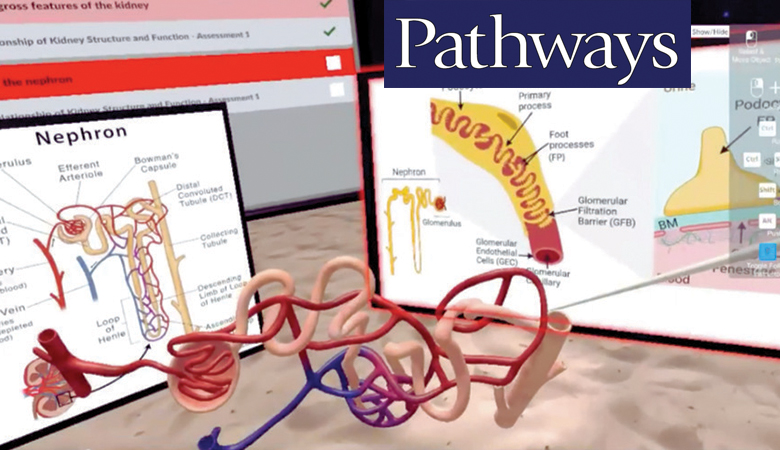Pathways: Apps, Gaming and Immersive Learning

Medical education continues to evolve, and UICOMP faculty are using advanced technologies to bring teaching into the hands of learners, provide opportunities for self-directed learning and build skills that advance excellence in patient care. Developing a successful mobile app or creating an effective immersive learning experience in virtual reality takes a team approach, and faculty at UICOMP have embraced this work with the support and valuable contributions from partners at Jump Simulation Center and companies who create the platforms to make it possible. This article highlights the work of a few of our UICOMP faculty and residents who have released mobile apps and developed courses in virtual reality for use in the medical student curriculum.
Digi-DDx by OSF Healthcare System & UICOMP
Digi-DDx is a clinical reasoning application developed by Lisa Barker, MD, and David Pinson, DVM, PhD. Jump Simulation Center’s Medical Visualization team, Kyle Formella, John Farmer, and Jakob Plotts led programming and user interface design. The app is available in both iOS and Android platforms, and is free to the public from the OSF Healthcare Innovations website. The Digi-DDx mobile application gives medical students the chance to practice diagnosing a patient by working through a case from start to finish, choosing the right tests to get to the right diagnosis, and tracking the costs and outcomes of decisions the students make. With this information, these novice learners can make mistakes safely, learn how to prioritize treatment choices once they have the correct diagnosis, and have opportunities for self-directed learning. Students are using Digi-DDx in several blocks of the curriculum, including using it for a neurology case with exercises on lesion localization. Since student feedback has been positive, the goal is to expand the use of Digi-DDx cases throughout the curriculum.
HistoLogic by OSF Health-care System & UICOMP
HistoLogic is an app designed to supplement student learning of histology. Jonathon Fisher, PhD, noticed students tend to struggle with this discipline, as only one-third of medical students have studied histology before entering medical school, but histology knowledge is necessary to identify pathology of changes due to disease. Dr. Fisher worked with graphics design and programming professionals at Jump Simulation to build the app, which can be used on mobile devices or tablet computers. Learners can use the app to review gastrointestinal and blood/ lymphoid tissues, and Dr. Fisher is continuing to add more organ systems. The app has a mode called "explore" where learners can view tissues at different magnifications and read about specialized structures, and a “game” mode for learners to test their knowledge at beginner, intermediate and expert levels.
Virtual Reality
Faculty Fellows Program on Technology in Medical Education (TiME)
In August 2021, UICOMP launched a new faculty development opportunity surrounding content development using virtual reality (VR) to support student learning. The Faculty Fellows Program on Technology in Medical Education (TiME) encourages faculty to explore, create, research and teach with technologies in undergraduate or graduate medical education. TiME Faculty Fellows received a full program of workshops, consultations, hands-on training and peer support over a period of six months to develop immersive learning experiences in VR.
The Fall 2021 cohort included four new to VR content development. Participants in the 2021-22 TiME Faculty Fellows Program included: Jenna Regan, PhD, clinical assistant professor; Tracy Soltesz, PhD: visiting clinical professor; and UICOMP residents Justin Steele, MD, and Ayesha Hasan, MD.
The cohort focused on creating content in Enduvo, an immersive learning platform in use at UICOMP. Enduvo provided exclusive access to platform developers and trainers on a regular basis through their 60-day onboarding workshop called the Enduvo Velocity Program. Faculty also benefited from close collaboration with Jump Simulation Center, the Medical Visualization Group, and Bramlet VR Lab, which provided mentoring, consultations, models, and additional training.
TiME Faculty Fellows created four courses. At the end of the program, an Enduvo-based immersive learning module on Mapping the Nephron designed by Jenna Regan, PhD, was used by students in the Block 5 curriculum as a supplemental activity in the UICOMP Anatomy Technology Lab’s Virtual Reality space.
Written by Leslie Hammersmith, Assistant Dean for Technology Enhanced Instruction
This article is part of the Fall 2022 edition of Pathways. Read the full issue.